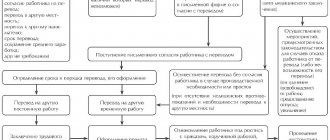Article 72.2 of the Labor Code is devoted to the analysis of issues related to the temporary transfer by an employer of a subordinate to another position.
It describes the form of payment, situations when this transfer is generally possible for the employer, and other nuances. Labor Code of the Russian Federation
dated December 30, 2001 N 197-FZ
Full text of the article, guides, additional information - in ConsultantPlus
Cases and reasons for temporary transfer to another job
Today, there are several main reasons and grounds for allowing the transfer of an employee to another organization to perform professional duties. Thus, the following will be considered legitimate:
- transfer of an employee, which is carried out due to the temporary absence of another employee;
- transfer of an employee to another organization, permitted in the event of force majeure circumstances, which include man-made and natural disasters, industrial accidents and other conditions that cause irreparable harm to the life and health of the workforce and the entire population as a whole;
- transfer of an employee, which is carried out even if it is necessary due to his state of health. In particular, a temporary transfer to another job may be due to the pregnancy of a woman employee of a hazardous enterprise.
Thus, it should be concluded that a temporary transfer of an employee to another organization can be carried out only if there are specific conditions set out in the Labor Code of the Russian Federation.
Terms of temporary transfers
Temporary transfer of an employee to another job is a fairly regulated process. Therefore, fulfillment of all conditions prescribed in labor legislation is the basis for the agreement between the parties to have legal force and be recognized as legitimate. In particular, it is especially important to take into account the period for which the employee’s transfer to another organization is allowed.
The duration of the temporary transfer of an employee depends on the circumstances that formed the basis for such a change in working conditions. The deadline for the employee’s transfer is negotiated by the two parties to the labor relationship, after which an agreement and the corresponding order are signed by the employer.
If we refer to Art. 72.2 of the Labor Code of the Russian Federation, the period for transferring an employee within one organization can be about one calendar year. However, if the employee’s relocation occurred due to the absence of another employee, for example, for health reasons, then the period during which the agreement of the parties is in force will end on the day the absent specialist leaves.
From this statement it follows that the period for transferring an employee to another workplace may exceed a year, for example, if a woman went on maternity leave to care for a child before he or she reached 3 years of age.
In addition, labor legislation provides for the possibility of transferring an employee to another place, even if the person does not sign the agreement. But in this case, the period cannot exceed 1 calendar month.
However, you should pay attention to the fact that, despite the period for transferring the subject to a new workplace, which is equal to 1 month, the employer can each time issue a new order to transfer the employee, thus extending this time period.
Organization of translation for pregnant women
Transfer for medical reasons is regulated by Article 73 of the Labor Code of the Russian Federation, but the special provisions of Article 254 of the Labor Code of the Russian Federation take precedence, since they regulate the specifics of transfers of pregnant women and employees who have children under 1.5 years of age.
Article 254 of the Labor Code of the Russian Federation. Transfer to another job of pregnant women and women with children under the age of one and a half years
If a woman expecting a child has a medical certificate, then she is temporarily transferred to another job that excludes the influence of unfavorable production factors, while she retains her earnings from her previous job. Until another position is provided, the pregnant woman is released from work while maintaining the average earnings for all working days missed due to waiting for a vacancy at the expense of the employer. A similar guarantee is provided for women with children under the age of one and a half years. The latter, if it is impossible to perform the previous job, are also subject to temporary transfer upon their application to another job with wages for the work performed, but not lower than the average earnings for the previous job until the child reaches the age of one and a half years. The employer has no right to refuse to make such transfers.
Transfer proposal for a pregnant woman
If the term of the employment agreement with a pregnant woman expires during her pregnancy and it was concluded during the performance of the duties of the absent employee, then in this case the employer is obliged to offer the employee a new position (Part 3 of Article 261 of the Labor Code of the Russian Federation) for transfer. The law allows the dismissal of a woman at the end of the employment contract during her pregnancy and the impossibility, with her written approval, of transferring before the end of pregnancy to another job that is available to the employer (a free position at the level of the woman’s work experience, lower-level or less paid), Moreover, her state of health allows her to perform the proposed duties. The employer is obliged to offer the pregnant woman all of his vacancies that meet legal requirements in the given area. Company management is obliged to offer vacant positions in other localities if such an option is provided for in a collective or individual agreement.
Art. 261. Guarantees for a pregnant woman and persons with family responsibilities upon termination of an employment contract
If the employee agrees to the transfer, then the parties sign an additional agreement to the old contract with the inclusion of amended clauses (about labor function, place of work, term of the employment contract).
Temporary transfer without employee consent
If we turn to the letter of the law, it is possible to transfer an employee to another place of work without obtaining his consent. This possibility is due to a number of reasons, which, in general, copy the grounds for transferring an employee by agreement of the parties:
- disasters that can be either man-made or natural;
- accident at work or accidents during the performance of professional duties stipulated by the employment contract;
- flood, fire or, for example, an epidemic;
- other conditions that threaten the lives of the population, including the workforce.
However, when transferring an employee to another place without consent, it is also possible, according to labor legislation, and in cases where:
- there is downtime caused by man-made, economic or production problems;
- there is a need to preserve the organization’s property and prevent its damage or complete destruction;
- It is necessary to temporarily replace an employee of the company.
It should be noted that all these grounds must be determined by an emergency situation, and not by the personal desire of the employer. Only in this case will such a translation be fully justified and legitimate.
Target
Having familiarized yourself with the types of temporary transfers, you can already imagine a typical situation in which this legal instrument can be used: in a certain area of the organization’s activities, there is an acute shortage of personnel and the employer does not have the opportunity to invite new employees to solve this problem.
To overcome this situation, employees are transferred from less stressful areas that were performing other work. Thus, transferring an employee to another position within the organization temporarily covers the shortage of personnel in a certain area of the company’s activities.
Temporary transfer regulations
As noted above, transferring an employee to another workplace implies compliance with certain regulations, like any other legally significant action:
- at the first stage, the employer must notify the employee of the need to transfer the enterprise employee to another workplace. To do this, the employer forms either a written request or outlines the need orally.
- Next, an agreement between the parties is formed, modifying the terms of the employment contract, which must be signed by the two parties to the legal relationship. The agreement contains comprehensive information about working conditions: the amount of wages, the length of the working day, the transfer period, etc.
- Once the agreement is signed, the employer can issue an order to transfer the employee for a specific period. The order must be presented in a unified form established by the labor legislation of the Russian Federation. In particular, the order is issued in standard form N T-5 or N T-5a.
- The order must be sent to the employee for review, after which he certifies that he has read the document with his signature.
However, it should be noted that the regulations for the temporary transfer of an employee, when his consent is not required, have different conditions. In particular, the employer initially issues an official order to transfer the employee, within the framework of which such a need is justified. The order has the same unified form N T-5 or N T-5a.
But in such situations, the order must be supported by additional documents that determine this need. If such documents are missing, the order will not have legal force, and the employee will be able to refuse the transfer legally. If the legal regulations are followed, an additional agreement is signed and attached to the current employment contract.
Entry into the work book
The law does not provide for the inclusion in work books of notes about cases of transfers of this kind.
A situation may arise when a person worked, for example, as a manager as a temporary transfer, and he needs to confirm this fact for further employment.
To confirm his experience, the employee can use a copy of the order for his transfer or an additional agreement to the contract.
Situations often arise when an employee remains to work in a new place even after the end of the temporary transfer period. It turns out that the employee will actually work in a new position from one date, and the information in the work book will be entered when the order for permanent transfer is issued. Some HR specialists deal with this situation as follows:
- in column 3, where the unit and position are indicated, they also write the date from which the temporary transfer was made;
- in column 4, reference is made to both orders of the director of the legal entity, approving both temporary and permanent transfer.
Refusal to perform work during translation
Since a temporary transfer is an action permitted by law, an employee’s refusal to perform work will be recognized as a violation of labor discipline. Moreover, if an employee does not return to a new workplace, this is entered into the report card as absenteeism.
However, it should be noted that the Labor Code of the Russian Federation also implies objective situations when an employee can refuse to perform work after his transfer. A similar legal norm is enshrined in Art. 219 and 220 of the Labor Code of the Russian Federation. Thus, disciplinary liability cannot be applied to an employee if:
- the performance of official duties poses a threat to his health or life due to violation of labor protection conditions (up to the elimination of all violations of labor standards);
- another place of work involves working in difficult conditions, for example, in hazardous production, which is not stipulated in the individual employment contract between the employee and the employer.
Therefore, it should be summarized that such a refusal to perform work during a transfer to another position will be fully justified, since the current labor legislation on the territory of the Russian Federation does not imply a legal norm that would prohibit a person from exercising his legal right.
Temporary transfer of employees to another workplace is a completely legitimate opportunity that is granted to the employer by the current legislation of the Russian Federation. However, such a power will be legally justified only in those situations where the legislative procedure for transfer is fully complied with, and all the rights and interests of the worker are taken into account.









